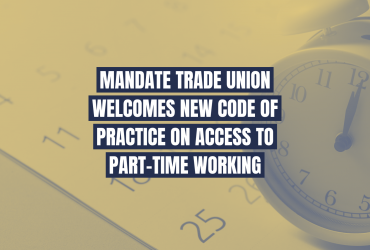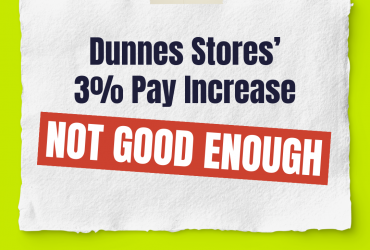MANDATE TRADE UNION ANNOUNCE RETURN TO SOCIAL PARTNERSHIP TALKS
Tuesday 29 April 2008
Union issue terms to ICTU for returning to partnership talks.
Mandate trade union has today (Tuesday, 29 April 2008) announced that they will be officially returning to social partnership talks tomorrow following two years of local collective bargaining. Mandate withdrew from partnership in 2006 because national deals had failed low paid workers in the private sector.
Mandate General Secretary, John Douglas, in a letter to David Begg, the Irish Congress of Trade Unions (ICTU) General Secretary, confirmed that the union would participate in the national pay talks taking place in Government buildings starting tomorrow, but that the union would “reserve their position and re-evaluate their participation at any time in the future.”
Mr Douglas pointed out that Mandate has not made the decision to enter discussions lightly. “There still remains a huge degree of scepticism as to the resolve of the process and the negotiators to deliver a better deal for lower paid workers.
“Mandate has delivered for its members since we withdrew from partnership in 2006 signing several deals which gave workers increases above and beyond national pay deals. However, we now feel that if our intention is to make a major impact on the low pay issue, we must engage with the social partners in these talks to ensure a positive outcome for low paid workers,” Mr Douglas said.
Mandate is one of the largest trade unions in Ireland representing over 44,000 workers in the retail and bar industries. New figures show that the wholesale and retail sector now accounts for the largest share of employment in the Irish economy, employing over 311,000 workers.
In the letter to ICTU, Mandate set out their priorities for tackling income inequality during the forthcoming negotiations including:
- Increases which deliver ‘real’ increases in pay for all workers;
- Significant flat rate floor increases which will benefit lower paid workers. (Percentage increases only serve to increase the gap between lower paid and higher paid workers);
- A clause which will allow unions to persue wage increases in companies where it is proved that wage levels are out of line with the “median private sector wage” i.e. private sector benchmarking. This would be of great assistance in closing the gender pay gap and effecting low wages in the economy.
In addition to pay, Mandate will seek:
- The immediate introduction of legislation which would give effect to a right to collective bargaining and trade union recognition;
- Better facilities and paid time off for shop stewards in order for them to carry out their duties and responsibilities;
- A mandatory pension scheme for those working in the private sector and in particular those in the lower paid categories;
- The introduction of legislation to protect agency workers and entitle them to equal treatment with employees on all terms and conditions of employment;
- Substantial investment in social and affordable housing provision;
- Access to full-time employment where extra hours are available and no objective reasons exists to refuse such requests.






